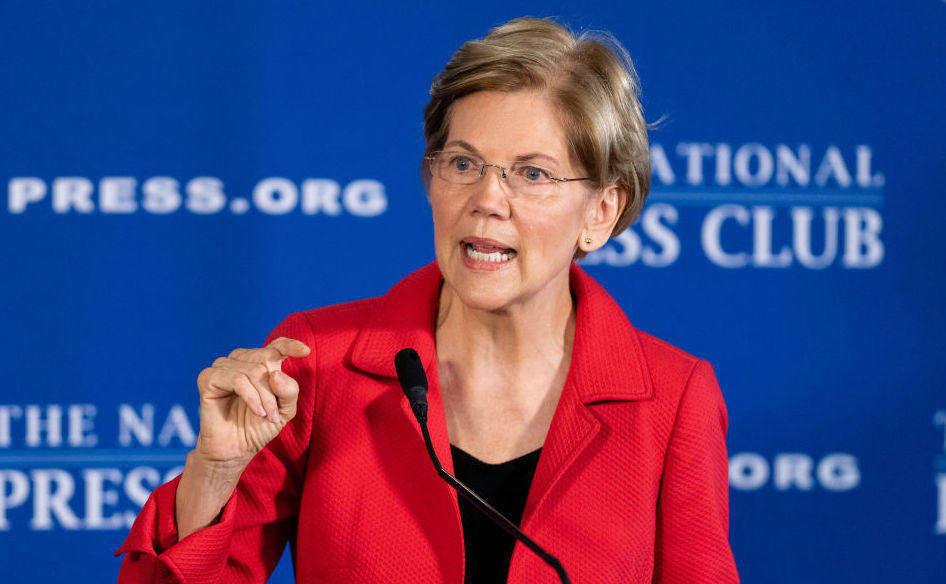 Never before has the issue of age become such a significant factor within American politics. At one end of the spectrum is what can only be described as a “children’s crusade” of energized young people on issues ranging from gun violence to climate change. In an ironic twist on the song “Children Will Listen” from the Stephen Sondheim musical “Into the Woods,” adolescents such as the Parkland high school students or 16-year-old Greta Thunberg have inspired older generations to rethink the consequences of their inaction on matters of national and global import. The best evidence of their effectiveness is not opposing arguments based on substance, but the willingness of critics to go after them personally.
Never before has the issue of age become such a significant factor within American politics. At one end of the spectrum is what can only be described as a “children’s crusade” of energized young people on issues ranging from gun violence to climate change. In an ironic twist on the song “Children Will Listen” from the Stephen Sondheim musical “Into the Woods,” adolescents such as the Parkland high school students or 16-year-old Greta Thunberg have inspired older generations to rethink the consequences of their inaction on matters of national and global import. The best evidence of their effectiveness is not opposing arguments based on substance, but the willingness of critics to go after them personally.
At the other extreme is the advanced seniority of many of the contenders heading into the 2020 presidential election. Consider the age of the following major candidates on November 8, 2020.
Bernie Sanders/79 years, 1 month, 26 days
Joe Biden/77 years, 11 months, 14 days
Donald Trump/74 years, 4 month, 20 days
Elizabeth Warren/71 years, 4 months, 12 days
No need to detail the concern raised by their younger competitors about their mental and physical agility. Or not being in touch with the culture and advanced technologies which steer the present and future.
In light of current events, I want to posit one more compelling reason we might want the country’s chief executive to be of less advanced age. Consider the following. At no time during these past presidential terms did we have the slightest concerns whether the offspring of the commander-in-chief were benefiting financially off of their father’s position.
- During John F. Kennedy’s term in office, out biggest worry was whether John-John would get lost under the Resolute Desk or Caroline would fall off her pony Macaroni.
- In the case of the children of Lyndon Johnson, Richard Nixon and Gerald Ford our attention was riveted not on business interests, but love interests. Their activities were more likely chronicled in the Style Section of the Washington Post than on the front page.
- Amy Carter, nine-years-old when she took up residency in the White House, became a topic of controversy only once, when a radio talk show host commented on her physical appearance.
- Coverage of Chelsea Clinton had nothing to do with her own behavior, but the situation in which she found herself when her father’s affair with Monica Lewinsky became public.
- Presidential offspring scandals hit a new low when George W. Bush’s underage, twin daughters Barbara and Jenna had a little too much to drink at Chuy’s while attending the University of Texas-Austin. (NOTE: Having lived in Austin and eaten many meals at Chuy’s, the bigger scandal would have been if underage UT students did NOT have too much too drink.)
- Which brings us to Malia and Sasha Obama, perhaps best known for eye-rolling at their father’s “daddy jokes.”
In contrast, history will remember the more chronologically mature children of past presidents for their financial or political activities, not the first family photographs or the trials and tribulations of growing up in the national limelight.
Of course, this is not to say anyone with the foresight to think they will be running for president at a more advanced period in their lives cannot go down a path that puts them in the same category as W. or Obama. Skip the first wife. In your late forties, 47 to be exact, choose a trophy wife (or two). And for heaven’s sake, remember that photo ops with the kids carry more political favor than those with dictators.
For what it’s worth.
Dr. ESP
 The second data point is the proliferation of loyalty programs. They are the best example that relationships travel on two-way streets. Why would a hotel chain or airline give you a free room or flight which it could otherwise offer paying customers to increase its bottom line? Because the numbers show you are more likely to patronize that company even when a competitor offers a lower price or is more convenient.
The second data point is the proliferation of loyalty programs. They are the best example that relationships travel on two-way streets. Why would a hotel chain or airline give you a free room or flight which it could otherwise offer paying customers to increase its bottom line? Because the numbers show you are more likely to patronize that company even when a competitor offers a lower price or is more convenient. Writers of fiction and non-fiction write best when they know their subject matters. And, as many of you know, I am currently drafting a political novel which offers a different and highly improbable twist on the Kennedy assassination. My focus is on the still unanswered question, what was the motive for killing Kennedy. To make the incredible just a bit more plausible, I have spent the past two years researching every aspect of the lives of JFK, Lee Harvey Oswald, Jack Ruby and other true-life individuals tangential to the story before injecting my fictional characters. It has been an educational and highly enjoyable exercise in the art of manufacturing a conspiracy by finding the dots to fill in the manufactured connections.
Writers of fiction and non-fiction write best when they know their subject matters. And, as many of you know, I am currently drafting a political novel which offers a different and highly improbable twist on the Kennedy assassination. My focus is on the still unanswered question, what was the motive for killing Kennedy. To make the incredible just a bit more plausible, I have spent the past two years researching every aspect of the lives of JFK, Lee Harvey Oswald, Jack Ruby and other true-life individuals tangential to the story before injecting my fictional characters. It has been an educational and highly enjoyable exercise in the art of manufacturing a conspiracy by finding the dots to fill in the manufactured connections. Twice this week, I have heard influential Democrats warning anyone who would listen to heed the lessons of history. The first involves impeachment of Donald Trump. Even though this may all change when Speaker Pelosi, dare I call her “Nervous Nancy,” meets with her leadership team this afternoon, she has been hesitant to green light impeachment proceedings despite the volumes of evidence of Trump’s high crimes and misdemeanors already available. Her hesitancy is based on a concern that impeachment without conviction by the Senate will result in higher approval ratings for Trump and strengthen the GOP heading into the 2020 election. To prove the point, Democrats point to the aftermath of the Republican-led impeachment of Bill Clinton in 1988.
Twice this week, I have heard influential Democrats warning anyone who would listen to heed the lessons of history. The first involves impeachment of Donald Trump. Even though this may all change when Speaker Pelosi, dare I call her “Nervous Nancy,” meets with her leadership team this afternoon, she has been hesitant to green light impeachment proceedings despite the volumes of evidence of Trump’s high crimes and misdemeanors already available. Her hesitancy is based on a concern that impeachment without conviction by the Senate will result in higher approval ratings for Trump and strengthen the GOP heading into the 2020 election. To prove the point, Democrats point to the aftermath of the Republican-led impeachment of Bill Clinton in 1988. Case #2: Elizabeth Warren at the head of the Democratic ticket will be a drag on down-ballot races for House and Senate. The fallacy in this prediction is not so much whether the historical facts are true, but what history one uses as a benchmark. If you rely on the 2016 election as your standard, you can make the case. After all, Democrats were expected, not only to retain the White House, but also to gain control of the House and Senate. But this comparison works only if you think of Warren as “the female candidate,” or the next Hillary Clinton.
Case #2: Elizabeth Warren at the head of the Democratic ticket will be a drag on down-ballot races for House and Senate. The fallacy in this prediction is not so much whether the historical facts are true, but what history one uses as a benchmark. If you rely on the 2016 election as your standard, you can make the case. After all, Democrats were expected, not only to retain the White House, but also to gain control of the House and Senate. But this comparison works only if you think of Warren as “the female candidate,” or the next Hillary Clinton. Like life, the presentation of entertainment awards is not always fair. I still bristle every time I think about the 1970 Academy Awards. Despite the fact Midnight Cowboy took home the Oscar for best picture, best director (John Schlesinger) and best adapted screenplay (Waldo Salt), Dustin Hoffman’s portrayal of Ratso Rizzo was deprived of the best male performance award when John Wayne won for playing himself in True Grit. Hoffman’s cinematic achievement was of particular note when viewed side-by-side with his big screen debut two years earlier as Ben Braddock in The Graduate.
Like life, the presentation of entertainment awards is not always fair. I still bristle every time I think about the 1970 Academy Awards. Despite the fact Midnight Cowboy took home the Oscar for best picture, best director (John Schlesinger) and best adapted screenplay (Waldo Salt), Dustin Hoffman’s portrayal of Ratso Rizzo was deprived of the best male performance award when John Wayne won for playing himself in True Grit. Hoffman’s cinematic achievement was of particular note when viewed side-by-side with his big screen debut two years earlier as Ben Braddock in The Graduate.